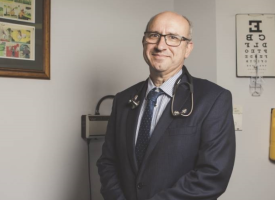AMA Transcript - AMA President, Dr Steve Hambleton, ABC News Radio, Tanya Nolan, 16 May 2014
Transcript AMA President, Dr Steve Hambleton, ABC News Radio, Tanya Nolan, 16 May 2014
Subject: GP co-payments
TANYA NOLAN: Well, as we've heard, health is firming as a clear battleline in the Senate and the lobby group representing the nation's doctors says the Federal Health Minister's claim that doctors will profit from the $7 co-payment proposed in this week's budget, is not true.
Health Minister Peter Dutton says government modelling shows GPs will reap a windfall of $468 million over four years, which will allow them to continue bulk-billing poorer patients.
But the Australian Medical Association's (AMA) federal president Dr Steve Hambleton says GPs will be 25 per cent worse off by bulk-billing patients under the co-payment scheme.
Speaking to me from Toronto earlier, Dr Hambleton said there will be other costs to be borne by doctors as well.
DR STEVE HAMBLETON: Currently if GPs are bulk-billing, it's very simple; there's very little staff required, it's a simple signature on a piece of paper or it's a key transaction with a computer. If there's a mandatory payment for everyone, then there'll be a requirement for banking, for change, for a float in the morning, for probably a new staff member to basically do the banking and, if you add up, it’s probably one staff member for four GPs will probably cost about the same as the co-payment.
TANYA NOLAN: So how do you think Peter Dutton reaches the conclusion that the co-payment will not only cover the shortfall in visits but deliver doctors a profit?
DR STEVE HAMBLETON: Well, I think it's looking at the simple figures, and of course you just need to be on the frontline of care to understand that that's not how it's going to be. I mean assuming you get the $7 up front every time, the doctor may be $2 better off if they were bulk-billing everybody.
I guess the thing to say is, look we're not against the principles that the Minister's trying to promote. I mean, the Minister is saying well if people can afford to contribute to their care then that they should and I think the AMA would say well we don't have a problem with that. But, the Minister also says they should make a contribution where they can afford to do so and I think that implies that he understands that there are some patients who can't afford to do so and that's the concern the AMA's got and we do want to work with government to say well what are the policy goals here?
We know from our exposure to our members that there are individuals that really will struggle and will defer care and I guess we've named them before, it's Aboriginal and Torres Strait Islander Australians. Already we have a gap we want to close.
The very low income earners who, if they've got a couple of sick kids and they've got to get a prescription for both and maybe even a pathology test, we could be talking about five co-payments or four or five co-payments on one day - one each for pathology, a couple of payments prescriptions and maybe a couple of payments for the doctor.
That may just be a discretionary payment like is it the dinner we buy tonight or do we go to the doctor and we don't want to put Australians in that position.
TANYA NOLAN: Peter Dutton also says that this is designed to break the bulk-billing business model that's currently being used by some doctors where they use it as a tool to lure patients to them when the doctor down the road doesn't bulk-bill. Do you agree that that may change that business model?
DR STEVE HAMBLETON: Well, it certainly would and I don't have any problem with the Minister's principle or the Government, the Prime Minister's principle that, if people can afford to contribute towards their healthcare then they should.
The AMA has a view that, to provide quality primary care, quality general practice care which will structurally change the costs in our health system, the GP could spend longer with the patient. We know they'll provide more comprehensive care. We've said people aren't accessing longer consultations because the payment structures are just not working.
Now if they could and we say that a standard visit for a GP on average should cost about $73, not $36, we would get a better productivity from our GPs from a health perspective, not a throughput perspective and we think that would benefit the system so we're not against co-payments.
We do have a concern though about those low income earners and we need to work with government to try and solve that.
TANYA NOLAN: So, if you believe that doctors won't profit from the co-payment, do you disagree with the Minister's premise that it will help you to continue to bulk-bill for the poor and the vulnerable?
DR STEVE HAMBLETON: Well, no sadly it won't. If a bulk-billing practice moves to a $7 co-payment there'd be no net benefit. Now, if they choose to bulk-bill someone after the July 2015, the rebate will be 25 per cent lower. It'll be the $5 rebate reduction lower and it'll be the low co-payment incentive lower, so probably $11 or $12 lower than now which is about a 25 per cent reduction.
Small businesses are not capable of taking a 25 per cent reduction. There'll be no incentive to direct bill. There's got to be a better solution.
TANYA NOLAN: So what is that solution? Has the Government reached out to you at all in devising this budget plan to try and maintain the safety net for the disadvantaged?
DR STEVE HAMBLETON: Well I think that's the key. I think the Minister has suggested he's already going to reach out to the Senators to try and get this through.
We'd also like to have the Minister reach out to the AMA and work with us to say well, you know, what are you trying to deliver? Is there a way we can sort this to deliver what the Government needs and still maintain that access?
Aboriginal and Torres Strait Islander Australians are a good example. We're trying to close the gap. We know that, in rural areas where there are very low incomes, large families and high burden of disease, that community controlled health centres have a real problem raising any funds, raising any co-payments from their clients, from their patients. We need to think about that. We do need to close that gap.
TANYA NOLAN: But this is the other side of the argument isn't it? Peter Dutton says Australians are currently funding 263 million free medical services each year, including 70 per cent of them from non-concessional patients. That's not sustainable, is it given that the population is aging, medical technology is advancing and will be costly down the track? Do you accept that premise?
DR STEVE HAMBLETON: Well, not quite. I mean it's interesting that 70 per cent of the bulk-billing is for non-concession cards holders. I mean that's perhaps where the Government should be focusing its attention.
Is it sustainable? Answer, yes. Because we are actually about well, we're just below the average for the OECD, for our spend of total health care in this country, so we're doing a pretty good job.
Now chronic disease management in this country for diabetes for example, number one in the OECD. We are one seventh, not half but one seventh of the admissions to hospital on out of control diabetics. It's a pretty amazing statistic so we're doing a good job.
Yes, costs are growing, not in primary care however, they're growing down the track in hospital care so we do need to make sure our primary care structures are set up to actually manage chronic disease, keep people out of hospital and this is the reform agenda that we've got to continue.
TANYA NOLAN: That's the Australian Medical Association's federal president Dr Steve Hambleton.
16 May 2014
CONTACT: John Flannery 02 6270 5477 / 0419 494 761



